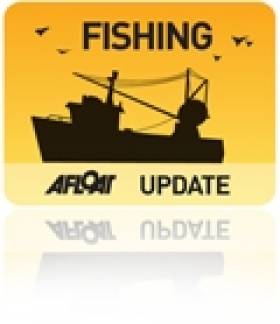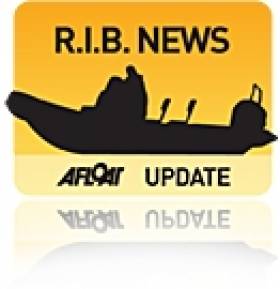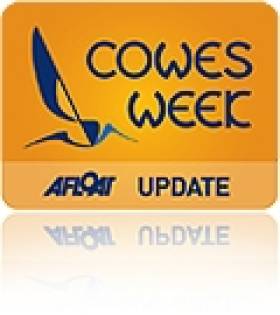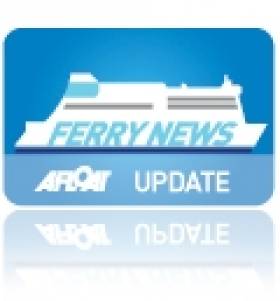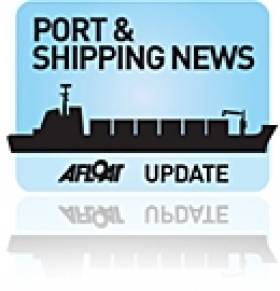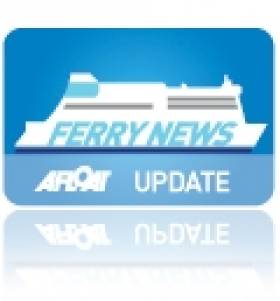Displaying items by tag: collision
The Umpire Strikes Back! Artemis in America's Cup Collision
With just seconds to go to race two of the America's Cup World Series in Bermuda Artemis Racing managed by Iain Percy ended up in a pre-start collision with the umpire boat. There was damage, but no injuries... and amazingly Artemis went on to win the race.
Artemis Racing grabbed the lion's share of the spotlight, writing an epic comeback story on Sunday at the Louis Vuitton America's Cup World Series in Bermuda.
On the race course, the three double-point races had three different winners with Artemis Racing proving the most consistent performer on the day to take the win.
But this was an unlikely victory. Not only did the Swedish challenger arrive at the event in fifth place out of the six teams, but in the pre-start ahead of race two, the team was involved in a collision with an Umpire boat, incurring serious damage.
In work worthy of an F1 pit crew, the Artemis Racing squad stripped off the broken bow sprit and the now useless Code Zero sail in record time. After a quick check for reliability and with less than two minutes to spare, the team was lining up for the next start. Incredibly, they blasted of the starting line with more speed than anyone else and won not only the start but the second race.
In the third and final race, the Swedish team needed to make a pass on the last leg to grab a fourth place finish and secure the points needed to win the regatta.
Emirates Team New Zealand, with an impressive win in race three, extends its advantage on the Louis Vuitton America's Cup World Series leaderboard.
Louis Vuitton America's Cup World Series Bermuda Results
1. Artemis Racing: 2 - 1 - 4 - 52 points
2. Emirates Team New Zealand: 5 - 2 - 1- 50
3. ORACLE TEAM USA: 1 - 3 - 5 - 48
4. Land Rover BAR: 3 - 6 - 2 - 44
5. SoftBank Team Japan: 4 - 4 - 3 - 44
6. Groupama Team France: 6 - 5 - 6 - 32
More from Artemis Racing:
Artemis Racing claimed a dramatic victory in the final Louis Vuitton America's Cup World Series event of the year.
The team headed to Bermuda with plenty to prove, and after racing was abandoned on Saturday, three races were scheduled for Sunday.
Team Manager and Tactician, Iain Percy, spoke of his relief after a trying few months.
"I'm very proud of the team. We had a lot of pressure to perform. I know perfectly well that we have a talented enough team to win these events, but things haven’t gone our way, we’ve hit the odd rock and capsized, and suddenly everyone was questioning us.
To deliver under that heat, and under the circumstances of the crash, was pretty impressive".
Artemis Racing made a great start in race one, and led most of the way before being pipped by Oracle Team USA at the finish line. In the pre-start of race two, with just a few minutes of the countdown left, the team was involved in a collision with an Umpire boat, incurring serious damage, and it appeared that Artemis Racing would be knocked out of the event.
Just moments before the starting gun fired, the team ducked behind the Japanese boat, and as Outteridge turned up towards the line, he was confronted with an Umpire boat heading directly towards him. The closing speed would have been in excess of 25 knots.
“At that point we couldn’t go anywhere,” Outteridge explained. “He went straight between our bows but thankfully nobody was hurt. There was a serious amount of damage to our boat though.”
Iain Percy said, “my first thought was for the safety of the umpires on the boat, we were all pretty shaken up”.
The Artemis Racing squad stripped off the broken bowsprit and the now useless Code Zero sail in record time. After a quick check for reliability and with less than two minutes to spare, the team lined up for the next start. Incredibly, they blasted off the starting line with more speed than anyone else and won not only the start but also the second race.
Outteridge continued, “We owned that start… It was huge payback for all the hard work from the guys who stripped the gear off, checked the boat, and got us ready just in time.”
Iain Percy spoke of his admiration for his Skipper, "There really was no time for pep talks, and we were frantically ripping carbon and rope off the boat trying to clear it. Before we had a moment to breath, it was 1:30 to the start.
I have to say, what Nathan Outteridge displayed there, is why everyone says he’s so talented. I’m not sure there are many people in the world that could have showed that composure and nailed the start the way he did, absolutely incredible".
In the third and final race, the Swedish team needed to make a pass on the last leg, and pulled off a fantastic foiling gybe to grab a fourth place finish and secure the points needed to win the regatta.
Winning the Bermuda event means that Artemis Racing rises to fourth place in the overall series rankings, and puts an important marker down in the venue for the 35th America's Cup in 2017.
"To be the first team to win an event in Bermuda, the venue of the next America’s Cup is just great for our team. We love it here; we’ve been training here all year, getting ready for the main event in 2017. Our results elsewhere haven’t been great but all that matters is how well we sail in this venue", said Outteridge.
It was an important victory for the team who struggled in the first two events in Portsmouth and Gothenburg, and Iain Percy spoke of what it will mean for the wider group.
"We’re a big team, and for every one of the sailors to go out today and perform, is a real boost going into the winter. You can’t buy that; you can’t put a value on a team knowing 100% that they are here to win this competition. Everyone will be working that little bit harder, and we’re going to have that little spring in our step through the whole winter. It’s going to project us towards winning in 2017".
Louis Vuitton America’s Cup World Series Bermuda Results
1. Artemis Racing: 2 – 1 – 4 – 52 points
2. Emirates Team New Zealand: 5 – 2 – 1– 50 points
3. ORACLE TEAM USA: 1 – 3 – 5 – 48 points
4. Land Rover BAR: 3 – 6 – 2 – 44 points
5. SoftBank Team Japan: 4 – 4 – 3 – 44 points
6. Groupama Team France: 6 – 5 – 6 – 32 points
And from Team BAR:
Sir Ben Ainslie's British boat finished fourth in this third leg. Land Rover BAR came third in the first race, but endured a tough second round after a technical issue saw them slip from first to last place.
They came second in the final race, while the regatta was won by Artemis Racing who are led by Britain's two-time Olympic champion Iain Percy.
Land Rover BAR are third overall with Emirates Team New Zealand leading.
"It was one of those days. We're still third, we still feel we've got the best team and I believe we will win the World Series," said Land Rover BAR crew member David Carr after his team finished fourth out of the six boats that competed.
The Bermuda leg followed events in Portsmouth and Gothenburg this summer.
Light wind saw racing abandoned on Saturday in Bermuda, which will host the America's Cup itself in 2017, and three shorter rounds were held on Sunday.
The Bermuda leg is part of a lengthy qualification process that will count towards the 2017 America's Cup Challenger Series, the winner of which will take on Oracle in the 2017 America's Cup.
It will be the 35th staging of the oldest competition in international sport which was first raced in 1851 around the Isle of Wight.
#fishing – A skipper who pleaded guilty to charges including failing to keep a proper look out has been fined more than £5,000.
Malcolm Edmund, who is skipper of the fishing vessel Sapphire Stone was charged following a collision with another fishing vessel Karen causing its loss.
On 22nd January 2014, the fishing vessel Karen was coming to the end of a four hour tow to the south east of the Island of Arran, when she was struck astern by the Sapphire Stone.
Sapphire Stone had just brought its final haul for the day aboard and was bound for Campbeltown for the night.
Skipper of the Karen, John Muir said she went down by the stern so quickly that the crew did not have time to get their lifejackets from the cabin.
The crew managed to launch the life raft but in the choppy seas it overturned and all three found themselves in the water. Mr Muir managed to right the raft and they all got in.
Meanwhile, the Sapphire Stone had managed to get alongside the life raft and recovered all the men safely onboard. She then continued to Campbeltown where they were met by the emergency services.
During an investigation by the Maritime and Coastguard Agency, it transpired that one of the crew employed onboard the Sapphire Stone had not completed the required safety training courses and that Mr Edmund had been issued with an improvement notice the previous September for a similar offence.
Today (8th June), at Newtownards Magistrates Court, Mr Edmund pleaded guilty to three charges - failing to keep a proper lookout, causing the loss of the fishing vessel Karen and breaching the Fishing Vessel Safety Training Regulations.
The judge, his worship Mr Mark Hamill said that the case came down to Mr Edmund not looking where he was going.
He fined him a total of £5,500.
Captain Bill Bennett, Surveyor in Charge of the Belfast Marine Office said: 'This very serious accident caused the loss of a vessel. It could very easily have resulted in loss of life. Skippers are reminded of the need to keep a lookout at all times.'
#Seven people were rescued from the Solent after their boat collided with another yacht and sank this afternoon.
The five men and two women were east of Bramble Bank when their yacht Ino collided with another named Valkyrie it has been reported.
Cowes RNLI lifeboat and Gosport independent lifeboat rushed to the scene and pulled the people out of the water.
The Cowes-based Corby 36 yacht Ino sank very quickly, according to the lifeboat team.
All people on board were wearing lifejackets and were taken to Trinity Landing in Cowes on the Isle of Wight.
No-one was seriously injured.
More on this story by the Southern Daily Echo here
#RIBs - Two top young British sailors are currently in the dock over an incident in Cardiff Bay four years ago in which a young girl suffered severe brain injuries.
As the Daily Mail reports, the girl - who was 11 at the time and has not been named - was one of four youngsters sent flying after two RIBs, piloted by sailing prospects Elleni Morus and Nia Jones, collied in darkness while crossing the bay.
The duo, both aged 17 at the time, were in charge of a group of 24 girls aged from 10 to 14 on a school-break sailing course.
Morus and Jones are accused of acting recklessly before the collision that threw two young girls overboard, a third half-way into the water and a fourth from one boat to the other.
The court heard how the group set out across the bay in four boats, two of them powerful RIBs, to return to their hostel after nightfall, but allegedly did not use lights.
It was also heard that the girls in Jones' speedboat had been encouraging her to drive faster and attempt swerves and wave jumping.
Both parties admit piloting boats without navigation lights but deny failing to travel at a safe speed and failing to keep lookout.
The Daily Mail has more on the story HERE as the trial continues.
Royal Navy Man Found Guilty Over Cowes Week Yacht Crash
#YachtCrash - A former serving lieutenant in the Royal Navy has been found guilty of breaching international maritime law and ordered to pay more than £100,000 (€117,000) in fines and costs over an incident during Cowes Week 2011.
According to Practical Boat Owner, the court in Southampton today (25 October)ruled that Roland Wilson had broken three Colregs (Convention on the International Regulations for Preventing Collisions at Sea) when his Corby 33 yacht Atalanta of Chester crashed into an oil tanker in the Solent on 6 August 2011.
It was ruled that Wilson 'did not keep an adequate lookout' (rule 5) when he sailed his yacht into the exclusion zone reserved for shipping traffic during the Cowes Week festival, then 'impeded a large vessel in a narrow channel' (rule 9b) and 'impeded a vessel constrained by his draft' (rule 18) as the tanker bore down on him and his vessel.
The court heard that a crew member on the eight-man yacht jumped overboard moments before the collision with the front of the tanker.
In the moments that followed the yacht's rigging became tangled on the tanker's anchor which collapsed the mast onto another crew member who was later hospitalised but not seriously hurt.
BBC News reports remarks from District Judge Anthony Callaway in passing sentence, saying: "Fortuitous it was that there was no loss of life. The potential for even greater and tragic consequence is, in my judgement, apparent.
"This was a serious yacht crewed by serious people in a regatta for a serious purpose. It was well equipped in terms of experience and ability to deal with any situation.
"This was not some Saturday afternoon jaunt by some inadequate vessel crewed by inexperienced, clueless and foolhardy people who frankly have no business being on the water at all.
"The yacht took a decision, and as I find the wrong decision, to sail towards the problem into the path of the tanker across a narrow channel. It should have kept clear and in the worst event used her engine."
Smartphone App Helps Boat Lost in Fog
#Smartphone - A yacht managed to avoid collision with a container ship off the coast of South Africa recently - thanks to a smartphone app.
As Yachting Monthly reports, Ian Engelbrecht and crew Ibolya Palko were delivering a catamaran from Cape Town to Durban when they were trapped in thick fog not far the coastline.
When their primary AIS system stopped working, Engelbrecht turned on a smartphone app called Boat Beacon as a way to alert them to any other ships in the vicinity.
The app did its job, alerting the pair to a container vessel travelling in the opposite direction, though they were unsure of what corrective action to take due to the poor visibility and not knowing the closest point of approach (CPA).
Despite this, collision was averted - and the incident has prompted the app developers to add a CPA bearing feature to their product.
Yachting Monthly has more on the story HERE.
Marine Notice: Regulations for Prevention of Sea Collisions
#MarineNotice - The latest Marine Notice from the DTTAS reminds all seafarers of their obligations to comply with the International Regulations for Prevention of Collisions at Sea (COLREGS).
The COLREGS are the basic “rules of the road” for all seafarers in charge of vessels on the high seas irrespective of type of vessel(s) concerned, and are “fully applicable to all vessels on the high seas and in all waters connected therewith navigable by seagoing vessels”.
New national regulations were made in 2012 and the International Regulations for Prevention of Collisions at Sea are now implemented in Irish law by the Statutory Instrument, Merchant Shipping (Collision Regulations) (Ships and Water Craft on the Water) Order 2012 (SI No 507 of 2012). This Order revoked and replaced the previous COLREG Orders, namely SI Nos 29 of 1984, 36 of 1990, 287 of 1993 and 47 of 2005.
In addition, new national regulations were also made in 2012 for signals of distress. The Signals of Distress (Ships) Rules 2012 (SI No 170 of 2012) update the provisions for signals of distress and their use in line with Annex IV of COLREGS. These 2012 Rules revoke and replace the previous Rules, namely SI No 234 of 1977.
Ferries in Collision at Rosslare Harbour
#FERRY NEWS - A Stena Line ferry was unable to dock in Rosslare last night after a collision with an Irish Ferries passenger craft in heavy winds.
TheJournal.ie reports that the Stena Europe ferry was attempting to dock at Rosslare Harbour after its arrival from Fishguard around 6pm when it made contact with the starboard bow of the Oscar Wilde, which was stationary in port.
RTÉ News says that neither vessel was badly damaged in the incident, but docking was postponed pending the departure of the Irish Ferries vessel, which was expected around 11.30pm last night.
More than 500 passengers and crew were on board the ferry at the time of the incident, which occurred amid gusts of up to 35 knots.
The return journey to Fishguard and this morning's Fishguard-Rosslare sailing were cancelled while an inspection of the vessel gets underway.
Polish Captain Sentenced After Shipping Collision
#SHIPPING – On 7th March 2012, Miroslaw Pozniak, the master of the merchant ship 'Union Moon', registered in the Cook Islands, was outbound from the port of Belfast when he collided with the inbound ferry 'Stena Feronia'
There were 51 passengers and 47 crew onboard the ferry and six people onboard the cargo ship. Fortunately no one was injured in the collision, however there was substantial damage to both ships.
The two ships were approaching the fairway buoy which marks the beginning of the main channel into Belfast harbour. As the 'Union Moon' passed the Fairway Buoy, she should have altered course to starboard on to an easterly heading, but unexpectedly altered course to port in to the port side of the approaching ferry.
Captain Pozniak pleaded guilty at court in Newtonards on the 12 March 2012 to breaches of the Railways and Transport Act 2003 by being four times over the alcohol limit. At a later hearing he was also charged with failing to keep a proper lookout and to causing serious damage to his own ship and to the 'Stena Feronia'.
Sentencing Mr Pozniac at Downpatrick Crown Court the Judge said:
"I believe that any sentence cannot be suspended. This sentence makes it clear that the following of the regulations, both in relation to alcohol and also in relation to the charting and proper adherence to accepted routes, is of vital importance. The ending of your 30 year career and this sentence effectively demonstrate that."
The Master was given a custodial sentence of 12 months on each of the three counts to run concurrently.
Captain Bill Bennett, Area Operations Manager (Survey and Inspection) for the MCA said;
"This was a very serious accident. It could so easily have been a dreadful tragedy but fortunately there were no injuries or fatalities. It is a matter of concern to the MCA that misuse of alcohol continues to play a part in a number of maritime accidents."
Collision Captain's Case Sent to Crown Court
#FERRY NEWS - BBC News reports that the captain of the cargo ship that collided with a passenger ferry in Belfast Lough could face up to two years in prison as his case has been sent to Crown Court.
Miroslaw Pozniak, 55, pleaded guilty on Friday to the charge of 'excess alcohol by the master of a ship' after the cargo vessel Union Moon collided with the Stena Feronia close to the Fairway buoy on Wednesday.
Both vessels were substantially damaged in the incident but there are no reports of injuries.
Newtownards Court heard yesterday that Pozniak has been fired by his employer. He will remain in custody until 20 March when the judge will again consider bail.


























